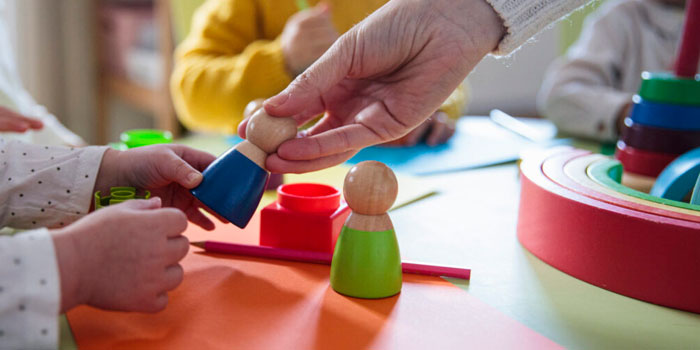
Dozens of autism therapy providers say the higher reimbursement rate proposed last week by Indiana’s Family and Social Services Administration is still not enough to cover their rising costs. Photo from Getty Images.
By Casey Smith
Indiana Capital Chronicle
INDIANA — The Indiana Family and Social Services Administration has increased proposed reimbursement rates for autism therapy services for Hoosier children with Medicaid after pushback from families, providers and state lawmakers.
Opponents said the state’s first, smaller proposal would have caused some therapy providers to lay off staff, reduce services or shut down altogether. Even so, questions are mounting over whether the increase will be enough for clinics to remain open — and provide the best quality of services.
The state agency released the updated plan last week, which increases the proposed reimbursement rate for autism therapy services rendered by a registered behavioral technician by 24% to $68.24 per hour — up from $55.19 per hour in the state’s initial proposed rate.
But therapy providers maintain the newest proposed rate doesn’t meet their operating costs, especially when considering inflation. Providers emphasized they also continue to face challenges from ongoing staffing shortages.
Indiana ACT for Families — a coalition of parents and therapy providers — is now calling on Gov. Eric Holcomb to require state leaders to “reconsider the cuts” and “have a fulsome discussion with the thousands of Hoosier families who will feel this detrimental impact to come to a reasonable, transparent rate agreement that is fair for all stakeholders.”
“This callous decision will force many centers to close, leaving thousands of Hoosier families stranded and desperate to find the care required for their children who have autism to live a normal life,” the group said in a statement. “This will also lead to significantly higher costs for the state in the long run.”
State reverses on proposed cuts
Initially, the state proposed a $55 reimbursement for providers for Applied Behavioral Analysis therapy — a significant decrease from the average $91 they received before. This most common form of therapy can improve social, cognitive and behavioral outcomes in some children with autism spectrum disorder, as well as the overall wellbeing of the child and their family, according to FSSA.
More than 700 comments were submitted to FSSA on the initial proposal — most of which were critical. Separately, more than 40 state lawmakers signed a letter asking Holcomb to intervene.
Parents also protested outside Holcomb’s home. The governor had earlier defended FSSA’s actions, saying it was appropriate and dependent upon feedback from stakeholders to set a statewide standard.
Some had called for the governor to slow the process down, but he rebuffed those appeals, saying it would be unfair for everyone, and that the months-long process was still ongoing.
In response, the state has since upped its proposal to $68 an hour. The increase is reflected in a larger reimbursement for administrative overhead costs, in addition to more money to cover time that supervisors can’t bill for.
Holcomb has not yet commented on the new proposal.
Earlier this year, Lt. Gov. Suzanne Crouch and GOP Sen. Jon Ford met with members of Indiana ACT for Families “to discuss the negative implications that a Medicaid reimbursement rate cut would have on access to high quality autism therapy in the Hoosier state,” according to the coalition. The meeting took place at Harsha Autism Center in Terre Haute.
Indiana’s Medicaid program didn’t start covering ABA therapy — a type of skills-based therapy beneficial to some families — until 2016. Without a precedent to set base rates, FSSA decided to pay a flat 40% of whatever providers charged the insurance policy.
The agency previously said payment of a percent of billed charges “has resulted in widely different reimbursement amounts for different providers of the same service.” Over the last three years, ABA expenditures have increased by more than 50% per year, “which is not a sustainable rate,” according to the state officials.
The agency reported that it spent $420 million on ABA claims for 6,200 children and young adults in 2022. Costs could continue to climb if a fee schedule — similar to what’s used for other services — isn’t implemented, FSSA warned.
In the third quarter of 2022, paid hourly rates for ABA services averaged $91 but ranged from $46 to $222 — according to an FSSA presentation from Aug. 8. Some of that included non-allowable costs and pushed Indiana’s reimbursement rate higher than peer states, according to FSSA.
Are new reimbursement rates enough?
Jason Shaw, president of the Indiana Providers of Effective Autism Treatment, which represents 15 ABA centers statewide, said that although the latest allowance for overhead costs increased from 15% to 20%, that’s still below the average of 35% needed for most centers.
FSSA is expected to present its updated proposal to the State Budget Committee Oct. 27, with implementation slated for January. It’s still unclear whether committee members will sign off on the plan or table it, pending further legislative review, however.
Rep. Ed DeLaney, D-Indianapolis, suggested the state could keep its current rates until the legislature can make adjustments during the 2024 session.
Rep. Craig Haggard, R-Moorseville, said that even if the budget committee gives the greenlight, state lawmakers will be watching — and could still take further action once the General Assembly reconvenes.
Haggard said his son received ABA therapy before it was covered by Medicaid. Under the FSSA’s previously proposed rate, the lawmaker feared most Hoosier families won’t be able to afford those services.
This content was originally published here.
